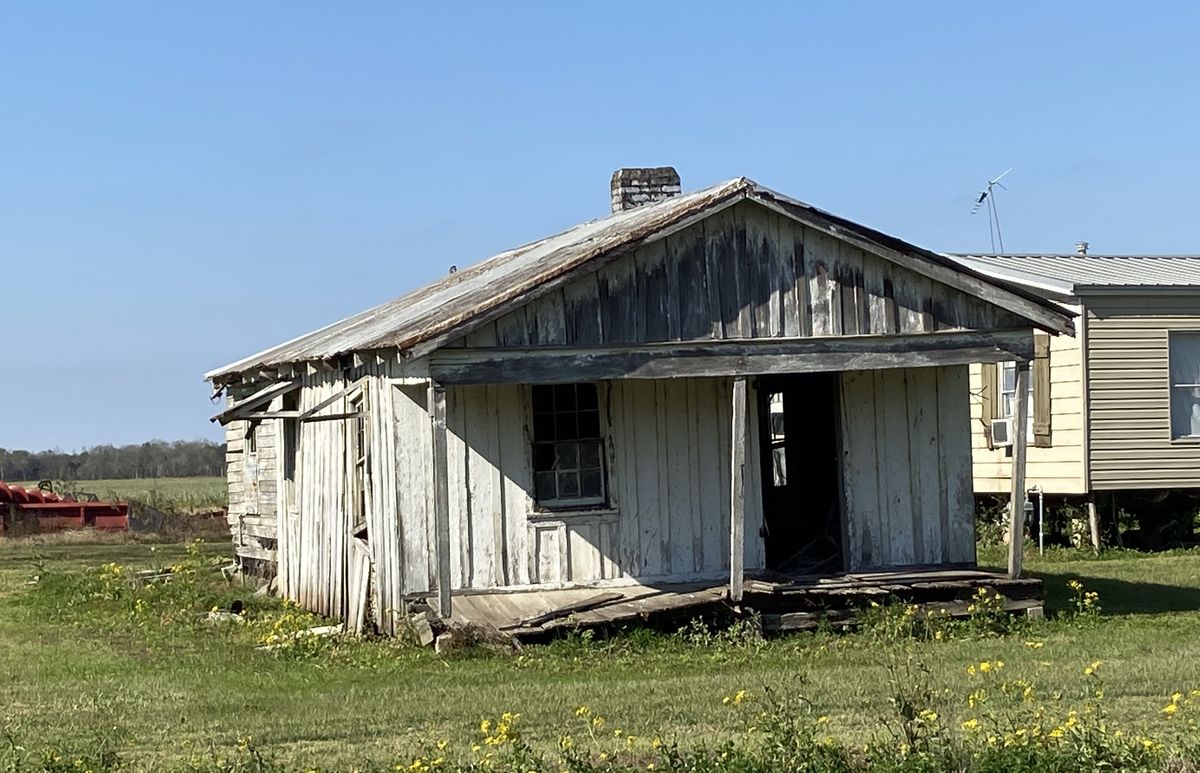Cost of citizenship….
Jan 22, 2022 09:22:33 #
Remnants of a turn of the century shotgun tenet house on a Louisiana sugar cane plantation in the area where my Sicilian grandfather in 1905 was an indentured farm laborer for two years as payback for his U.S. citizenship.

Jan 22, 2022 09:25:54 #
Very interesting. How did that work for your grandfather? Did someone offer to pay his way to the U.S. in return for his two year's work? Or was it less voluntary than that?
Jan 22, 2022 09:28:11 #
Jan 22, 2022 09:46:20 #
Visual history well done.
Sirsnapalot wrote:
Remnants of a turn of the century shotgun tenet house on a Louisiana sugar cane plantation in the area where my Sicilian grandfather in 1905 was an indentured farm laborer for two years as payback for his U.S. citizenship.
Jan 22, 2022 10:01:39 #
fourlocks wrote:
Very interesting. How did that work for your grandfather? Did someone offer to pay his way to the U.S. in return for his two year's work? Or was it less voluntary than that?
Generally the agreement would have been much less straightforward than that.
The person would think they were agreeing to work off a simple debt however upon arrival they would learn that while they were working on the ticket cost they had to live in a house like that and they had to pay rent for it which was usually a very substantial part of the earnings.
Usually they were required also to buy provisions through the landlord at ridiculous markup.
I have ancestors just a few generations back who were in a similar situation but from Scotland.
Jan 22, 2022 10:21:12 #
fourlocks wrote:
Very interesting. How did that work for your grandfather? Did someone offer to pay his way to the U.S. in return for his two year's work? Or was it less voluntary than that?
After the civil war when the slaves were freed, the labor intense sugar cane plantation were in need of an abundance of worker’s.
Not sure of the details but I was told that the U.S. Dept. of Agriculture made an agreement with the people of Sicily for an exchange for U.S. Citizenship.
Jan 22, 2022 10:25:12 #
chikid68 wrote:
Generally the agreement would have been much less ... (show quote)
My grandfather told similar horror stories of entrapment.
Jan 22, 2022 10:27:12 #
gvarner
Loc: Central Oregon Coast
DeeAndre wrote:
And now you can just walk across the boarder.
And when their employer discovers they’re illegal they become modern indentured servants, the penalty for complaining being sent back over the border or jailed.
Jan 22, 2022 11:05:09 #
Jan 23, 2022 10:45:47 #
fourlocks wrote:
Very interesting. How did that work for your grandfather? Did someone offer to pay his way to the U.S. in return for his two year's work? Or was it less voluntary than that?
Listen to the words of the song "Sixteen Tons" by Ernie Ford, recorded back in the 1950s and it gives a bit of insight into the situation.
Jan 23, 2022 10:46:49 #
Jan 23, 2022 15:48:47 #
RodeoMan
Loc: St Joseph, Missouri
DeeAndre wrote:
And now you can just walk across the boarder.
South or North.
Jan 23, 2022 15:52:18 #
RodeoMan
Loc: St Joseph, Missouri
PhotogHobbyist wrote:
Listen to the words of the song "Sixteen Tons" by Ernie Ford, recorded back in the 1950s and it gives a bit of insight into the situation.
Merle Travis, first, but I agree with your point.
Jan 23, 2022 16:04:59 #
RodeoMan
Loc: St Joseph, Missouri
There is an interesting eye-opening book, Slavery by Another Name, by Douglas Blackmon, also made into a TV special about the peonage system that arose after slavery. Black men were often arrested for minor or trumped up charges and sentenced to work gangs or leased to local landowners to work off their fines which somehow seemed to never get satisfied. Under the Peculiar Institution, the slave was a valuable commodity and it really wasn't to owner's advantage to lay ruin to his investment, although this was done countless times. With the peonage system there really was no financial reason to take care of the individual worker. If a worker died or was injured and couldn't work, then the landholder could just order up a replacement. Many of the immigrant laborers also worked under deplorable conditions.
Jan 23, 2022 17:29:23 #
fourlocks wrote:
Very interesting. How did that work for your grandfather? Did someone offer to pay his way to the U.S. in return for his two year's work? Or was it less voluntary than that?
That's exactly how it worked for a great, great etc etc. grandfather who came here in the 1630's. It was completely voluntary and the benefactor was a neighbor who loaned him the money in exchange for his two or three years of service (labor).
If you want to reply, then register here. Registration is free and your account is created instantly, so you can post right away.








